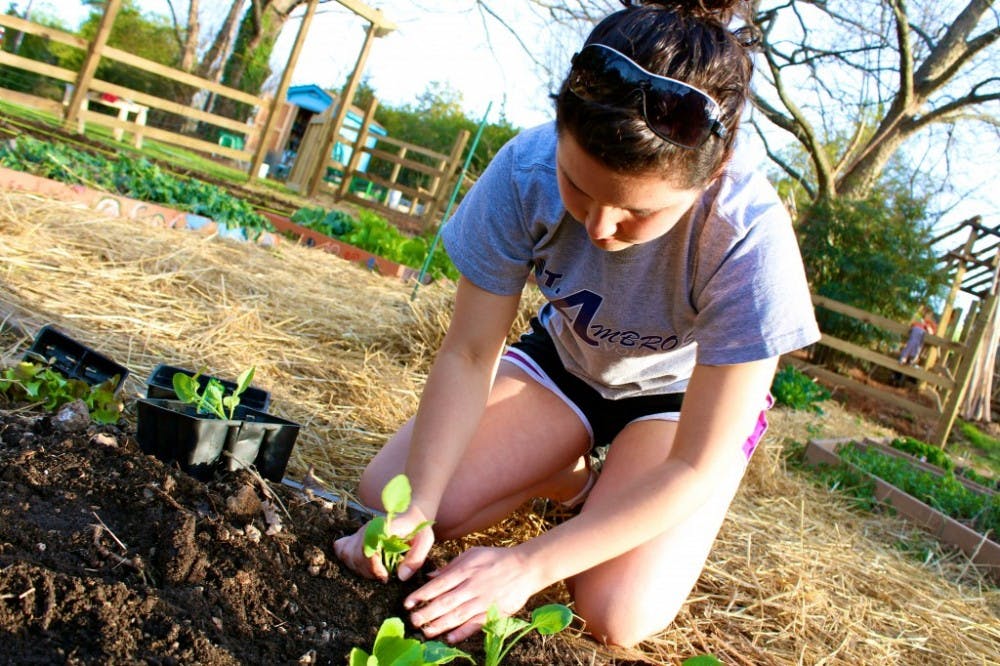Instead of picking up fast food for lunch, students in a new Garden Studio class can make their own meal — literally.
Michael Strickland, professor in English and environmental studies, decided to start the class two years ago as a way of teaching students of any major how to properly plant and maintain a home-scale garden and harvest their own food.
“It’s really about producing good food in small amounts of land in the most efficient manner,” Strickland said. “I also wanted students to learn techniques that will connect back to the land and will supplement life skills later on.”
The idea for the class came from a student who created the Elon Community Garden behind Powell House for her senior thesis project. Strickland was on the student’s thesis committee, and he immediately got his students involved with the project.
“There was a lot of student interest, and if we were going to run the garden in a coherent fashion, it had to be more than just a club or organization,” he said.
This new project project spawned into two classes of 35 students, divided into labor groups to focus on a particular aspect of preparing the garden. Junior Kileigh Browning is part of the infrastructure group, which is in charge of making an archway and paths for the garden.
“We had a lot of work to do when we first got here,” Browning said. “You couldn’t really tell that it was a garden in use, but my favorite part of all this has probably been seeing the garden change so drastically.”
These changes were the result of work the students do when the class meets in the late afternoon, when students tend to have more free time. Strickland said it’s a lot of physical labor that students may not have expected when they signed up for the class, such as making a fence to keep animals out, but they all seem to be fairly excited about it.
“It involves a lot of digging and hoeing to get the garden ready,” he said. “They’ve done a lot of things they probably hadn’t planned on.”
But Browning said she doesn’t mind the dirty work because of the connections she has developed with the environment through doing such a hands-on project.
“I think it’s really important for students to get their hands dirty and be able to interact with the environment instead of just sitting in class,” Browning said. “Sometimes it doesn’t feel like a class to me, it’s more like playing.”
Another benefit of maintaining the garden, Strickland said, is that students can take the food they grow home with them, especially when students stay at Elon over the summer to take care of the garden as a summer intern.
“The garden is the most productive in summertime, so you get a lot of really good food,” he said. “I’ve had student interns talk about their food bills for the summer being (almost nonexistent) because they eat the food they grow.”
Though he did not work as an intern, senior Phil Feldman stayed at Elon last summer and often ate food grown in the Elon Community Garden and in his own garden at home.
“I would take vegetables home and make cabbage leek and potato soup, and I made tea out of different things,” Feldman said. “I really like being able to grow things on my own.”
The overarching concept of the class, though, is to focus on the art and craft of food production gardening in a traditional studio course more so than in a lab, which is why the class is called Garden Studio, according to Strickland. It’s also about learning skills that used to be heavily relied on in the past that have been forgotten over the years.
“This class is about taking a few square feet of your backyard and learning how to produce good, wholesome food for you and your family and friends,” he said. “We’re relearning those cultural skills that we lost over generations as time went on.”
The class is offered in both spring and fall, with a different seasonal emphasis each semester. Contact Michael Strickland at mstrickl@elon.edu if interested in becoming a summer garden intern.


